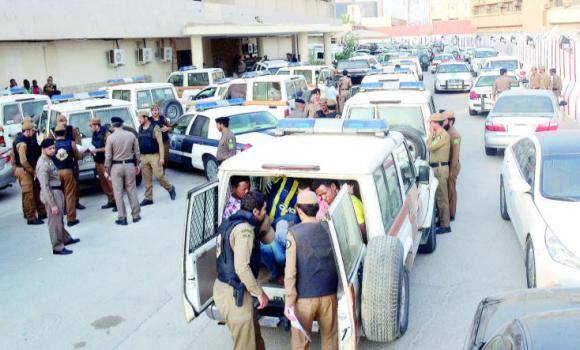
Jeddah, Nov 7: The Kingdom’s commercial districts and farm areas have taken a beating as businesses continued to struggle to staff shops, supply vendor operations and produce farms in the wake of the Labor Ministry’s relentless crackdown on illegal workers.
Jeddah’s central vegetable market (Halaga), a key commercial hub that supplies the city’s markets with fresh produce, was hit Wednesday by two busloads of labor inspectors, who detained dozens of suspected undocumented workers, mostly from Yemen and Pakistan.
Inspectors checked hundreds of employees to determine their legal status during the three-hour operation.
“I was detained, but when I showed my iqama with my shop owner’s details, the police released me without any problem,” a Yemeni vegetable worker told Arab News.
The raids have had a direct impact on area markets, which have raised produce prices by as much as 100 percent. Farmers in Jazan, Baha, Taif and Asir also reported raids, which in turn have affected the flow of supplies to markets.
The Yemeni community, which is traditionally active in gold shops and general retail businesses, has been especially hard-hit, leading to further commercial disruptions.
Minimal staffing at other commercial venues, such as liquid propane centers, have disrupted propane supplies to Jeddah and Riyadh neighborhoods.
Real estate experts, meanwhile, predicted that demand for commercial real estate was expected to drop by as much as 30 percent. Hamad bin Ali Al-Shuweir, chairman of the National Real Estate Committee at the Council of Saudi Chambers of Commerce and Industry, said workers are not bound by specific rental contracts, a matter that will have no significant impact on the residential sector.
Abdullah Al-Magluth, a researcher and real estate expert, however, said demand for rental offices and shops will fall, with some business owners already closing their doors or putting their property up for sale.
“The correction of foreign workers’ status has a positive outcome, but the negative impact will hit the commercial real estate sector by reducing the demand for shops and flats, in addition to other activities,” Al-Magluth said.
While Saudi small and medium business owners are reeling from the effects of the end of the amnesty period on Nov. 3 and the subsequent roundups of illegal workers, expatriate’s home countries are developing rehabilitation plans to accommodate migrants returning from the Kingdom.
In India, the Kerala state Cabinet established a program that encourages industrial, finance, agriculture, dairy, tourism, fisheries and labor sectors to assist returning workers to set up small businesses with capital investments of up to 2 million rupees.





Comments
Add new comment